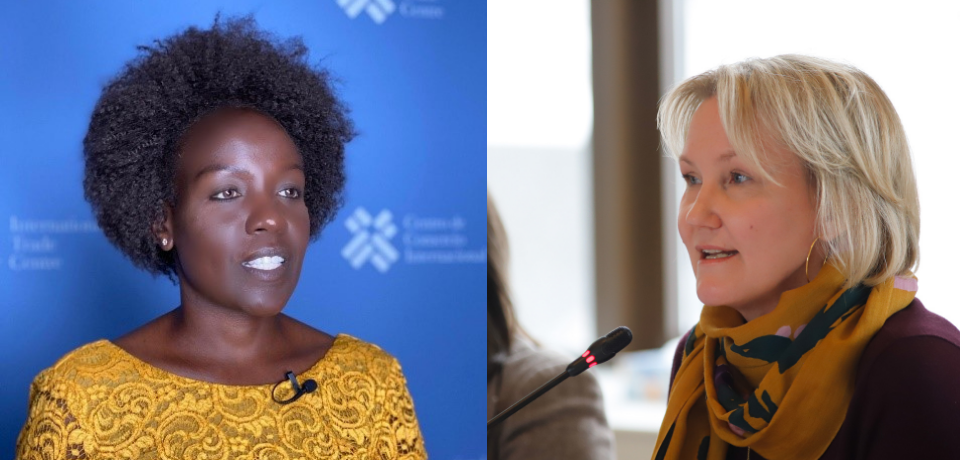Author: Dr. Bessma Momani
BiographyDr. Bessma Momani
Dr. Bessma Momani is Assistant Vice President of International Relations (2020) and Full Professor of Political Science at the University of Waterloo, Senior Fellow at the Centre for International Governance Innovation (CIGI), and a Non-Resident Fellow at the Arab Gulf States Institute in Washington, D.C.
She was a Non-Resident Senior Fellow at both the Brookings Institution and Stimson Center in Washington, D.C., a consultant to the International Monetary Fund, and formerly a visiting scholar at Georgetown University’s Mortara Center. She was a 2015 Fellow of the Pierre Elliott Trudeau Foundation and now sits on its board of directors. She is also a Fulbright Scholar.
Dr. Momani currently sits on the National Security Transparency Advisory Group (NS-TAG) to advise the Deputy Minister of Public Safety Canada and other Government officials on improving transparency to Canada’s national security and intelligence departments and agencies. She is a frequent contributor to international media on international affairs and writes regular op-eds in the Globe and Mail and Time Magazine.

Dr. Momani is a Full Professor of political science at the University of Waterloo and Senior Fellow at the Center for International Governance Innovation, specializing in international affairs, diversity and inclusion, and Middle East politics.
She was interviewed by Kundan Mishra, Program Officer at the Global Centre for Pluralism on April 30, 2020.
We asked Dr. Momani to reflect on the impacts of the pandemic on existing inequalities in the Middle East and North Africa, and policy responses across the region. She also shares what she sees for the future of this region post-pandemic and the important lessons to take forward.
The following is a transcript of the interview, which has been edited for brevity and clarity.
Kundan: During this global health crisis, issues around equity and inclusion are being revealed and exacerbated in all sectors. What have you observed in terms of the impact of COVID-19 on vulnerable and marginalized groups in the Middle East and North Africa?
Dr. Momani: Internally displaced people and refugees are probably the most vulnerable. They often fall through the cracks. They have no real authority above them who can administer the kind of public health infrastructure needed. The challenges they face often include lack of running water, proper nutrition, and a low baseline of health to begin with. They tend to be poor, and live in tight quarters. All of this compounds the problem of a spread of COVID into their camps.
The same vulnerability exists among guest workers in the Arab Gulf. They also tend to fall in that governance gap and do not have a very good baseline health to begin with. They may have running water, but still live with many people that are all crammed into a single room. Many of them work in the construction industry, which is at a standstill right now throughout the Gulf.
Then you have the urban poor in slums and shanty towns in places like Egypt, Morocco and Iraq. While the Middle East is not nearly as poor as other parts of the world, and the region does not have the same extremely high rates of urbanization and density (of course, there are exceptions, like Cairo which is a real megacity), there are vulnerabilities for sure. Nevertheless, in comparison to other developing regions, I think that the Middle East is not as worse off.
Kundan: What need to be the priorities for Middle East governments and policy makers in the post-COVID-19 era?
Dr. Momani: Mideast government priorities should be to keep their people safe and provide the public health infrastructure that will be sorely needed. Certainly, as time goes on, the priority will be to develop proper mechanisms for distributing vaccines once we get to that phase. They will also need to build public trust, or try to regain public trust, in their health authorities – all of that is going to be necessary for them to combat the virus.
One needs to consider that this is not a region where there is a lot of public trust in government. In some countries, there is a breakdown of trust right now, such as in Lebanon or conflict areas like Yemen, Syria, and parts of Libya. That will compound their challenges in getting vaccines and public health compliance.
Kundan: Considering that there is a huge variation in terms of governments and political contexts in the MENA region, are there specific countries or examples where a comeback from this pandemic would be smoother than others?
Dr. Momani: Well, money talks. Certainly, we have countries like the UAE, which is well-endowed financially, already has a strong surveillance of its people, and is able to enforce the kind of strict closure needed to combat the virus. Ironically, this is not a crisis that is easy to manage when you are a liberal democracy, and there is really no flourishing liberal democracy in the Middle East. So again, ironically, it is going to be harder to implement the kinds of public health measures that require strict compliance in some Western countries.
But at the same time, this also means that Middle East governments with strong centralization of power, like the UAE, can get compliance with quarantine and surveillance through their diktats.
Having said that, one may not be able to apply what happens in the UAE to other countries where they do not have the money and finances, or do not have the ability to test everybody and use technical means to conduct contact tracing that will help limit the spread of the virus. This is a disadvantage for those countries that are not wealthy. Most countries in the Middle East are not at the very bottom of international rankings, but they are certainly not very high-income earners either. You cannot see the same kind of success in Middle East countries as you would see in South Korea, for example.
Again, the UAE and some of the other Arab Gulf countries are probably exceptions because they have the finances and it is certainly not because of their own technical or medical ingenuity. Arab Gulf countries do not know how to deal with this better than anyone else does, but having strong financial reserves allows them to implement the kinds of policies that will help manage the spread. Moreover, they have the control over their society to be able to implement the kind of draconian measures needed to control the virus. I would not want to see these political systems being valorized in any way, but it is what it is.
Kundan: How will the ongoing conflicts in the region affect authorities’ abilities to address equity issues in the post-pandemic era?
Dr. Momani: It is a double whammy to the region. If you have a war situation, it is going to be extremely difficult for any government to respond. Active conflicts in the Middle East right now include Syria, Libya and Yemen. Those are places where there are true flashpoints and actual combat. Those hotspots will definitely not get control of the virus’ spread. It is very difficult to stymie the spread of the virus when you have multiple sources of power and authority. Added to that, in some cases like Yemen, you have extreme poverty and poor health infrastructure even before the war and the current health crisis. So yes, there are going to be huge discrepancies.
Kundan: What do you hope that global societies learn from this experience moving forward?
Dr. Momani: The greater need for global cooperation and public trust with citizens. One needs to have the trust of citizens. You cannot do that if you do not have some form of political liberalization and active civil society. Being able to manage these kinds of pandemics in the future will depend on having that kind of public trust.



